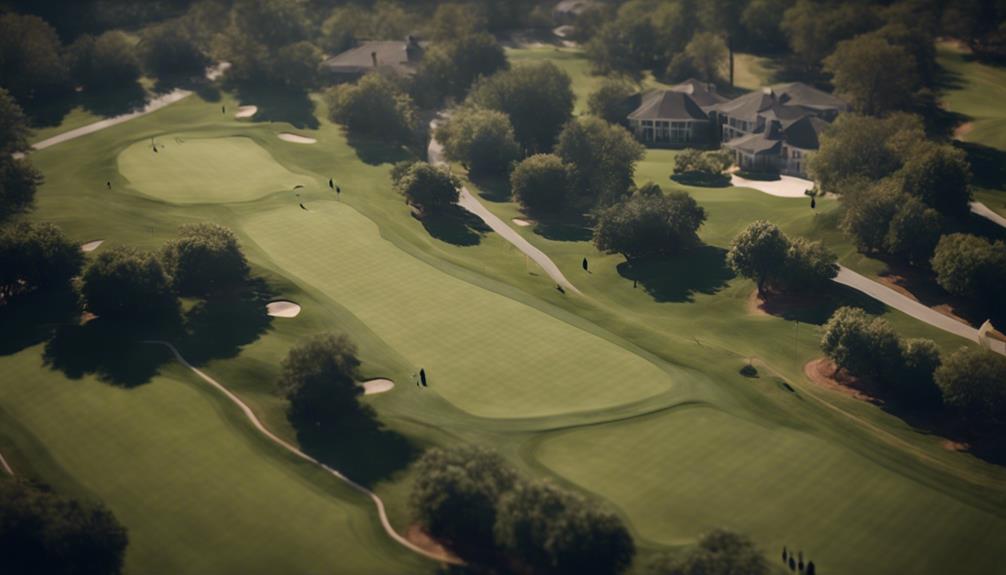- 7 Top Flite Golf Clubs XL for Improved Performance - September 28, 2024
- Top Flite Golf Clubs: Top 5 Reasons to Choose Them - September 28, 2024
- Top 3 Golf Club Fitters for a Perfect Swing - September 28, 2024
As a golf course owner or operator, you face a unique set of risks and liabilities that can threaten your business, from slips and falls to severe weather events. Thorough golf club insurance coverage is essential to protect your property, assets, and reputation. This can include liability coverage, property damage protection, equipment insurance, and coverage for unique risks like flood and water damage. By understanding the types of risks and liabilities your golf course faces, you can tailor your insurance coverage to meet your specific needs. Learn how to develop a robust risk management strategy that safeguards your operations.
Key Takeaways
- Golf clubs need liability coverage to protect against accidents, injuries, and lawsuits, including general liability, liquor liability, and golf pro professional liability insurance.
- Property damage protection is essential, covering physical assets like buildings, driving ranges, golf carts, and clubhouse, as well as equipment and inventory.
- Specialized coverages are available for unique golf course risks, such as errant golf ball damage, flood and water damage, and equipment malfunction.
- Workers' compensation insurance and employee safety protocols are crucial to protect employees from work-related injuries and illnesses.
- Expanded coverage options are available for golf courses hosting events or with property beyond immediate boundaries, providing customized protection for unique risks.
Understanding Golf Course Risks
As you step onto the lush green terrain of a golf course, you're surrounded by potential hazards that can quickly turn a leisurely game into a liability nightmare.
Acknowledging and addressing these risks is vital to providing a safe and enjoyable experience for players, staff, and guests.
One of the most significant risks is slips, trips, and falls, which accounted for 25% of accidents in 2022 and 44% of general liability claims.
In addition, impaired or inexperienced drivers and passengers can increase risks, making it necessary to implement safety protocols and monitor driver behavior.
Additionally, on-site restaurants and banquet facilities pose unique liquor liability and food safety concerns, requiring specialized risk management strategies.
Severe weather can also cause injury or damage, emphasizing the need for thorough insurance coverage and a disaster response plan.
Effective risk management is key to minimizing these hazards and guaranteeing that your golf course operates smoothly and safely.
Types of Golf Course Insurance
When it comes to insuring your golf course, you'll want to weigh the different types of coverage available.
You'll need to think about liability coverage options to protect yourself and your business in case of accidents or injuries.
Additionally, you'll want to explore property damage protection and equipment insurance plans to safeguard your assets and equipment.
Liability Coverage Options
You need to weigh several liability coverage options to safeguard your golf course is protected from various types of risks and lawsuits.
One essential option is general liability insurance, which covers losses due to services, operations, or employees. In fact, 44% of general liability claims at golf courses are due to slips, trips, and falls, making this coverage a must-have.
Another important option is liquor liability insurance, which covers damages resulting from serving alcohol, a significant concern for golf courses with on-site restaurants and banquet facilities.
Additionally, golf and tennis pro professional liability insurance can protect your course from damages like injuries and negligence claims, which can be a significant risk for golf courses with instructors and trainers.
Don't forget to weigh cyber liability insurance, which covers losses due to data breaches or cybercrime, essential for golf courses that handle sensitive customer information.
Finally, errant golf ball damage coverage is a specialized liability coverage option that protects golf courses from damages caused by errant golf balls.
Property Damage Protection
Your golf course's physical assets are equally vulnerable to damage, and that's where property damage protection comes in, providing thorough coverage for your course's buildings, greens, and equipment.
Golf course property insurance is designed to protect your course's valuable assets from damage, including target greens, teeing grounds, and sand bunkers, as well as specialty landscaping sprinklers and underground wiring.
This type of insurance also covers golf carts and mobile equipment, which can be covered on a replacement cost basis, and includes coverage for debris removal and tree replacement.
Additionally, you can enhance your policy to cover unique risks, such as hole-in-one promotions, landscape cleanup and repair, and protecting golf course operations.
You can also extend your coverage to include course property used off-premises, up to 1,000 feet or more past the premises, to protect against risks like golf balls going out of bounds and carts used off-course.
With golf course property insurance, you can have peace of mind knowing your course's physical assets are protected.
Equipment Insurance Plans
As a golf course owner or manager, you understand the importance of having the right equipment to maintain your course's daily operations.
Equipment insurance plans are designed to protect golf courses from financial losses resulting from damaged or stolen equipment, machinery, and tools essential to maintaining the course's daily operations.
This type of insurance coverage provides financial protection against unexpected equipment failures, theft, or damage, guaranteeing that your course can continue to operate smoothly.
You can customize your equipment insurance plan to cover specific items, such as golf carts, mowers, and other essential equipment.
This coverage can also extend to leased or rented equipment, providing additional financial security.
By investing in equipment insurance, you can minimize downtime and reduce the financial burden of replacing or repairing damaged equipment.
With the right equipment insurance plan in place, you can focus on what matters most – providing an exceptional golfing experience for your members and guests.
Coverage for Unique Risks

As you consider golf club insurance, you'll want to think about the unique risks that can impact your course.
You'll need to protect against flood and water damage, theft and vandalism, and equipment malfunction risks that can cause costly disruptions.
Flood and Water Damage
Floods and burst pipes can suddenly inundate your golf course, causing devastating water damage to equipment, buildings, and even the greens themselves.
As a golf club owner, you're well aware of the financial burden that comes with repairing or replacing damaged assets.
That's why having flood and water damage insurance coverage is vital.
This type of coverage will help you recover from unexpected water-related disasters, getting your golf course back to normal operations quickly.
When considering flood insurance, you'll want to assess your golf course's flood risk.
If you're located in a high-risk flood area, you may need to purchase a separate flood insurance policy.
Additionally, review your policy to guarantee it covers not only physical damage but also business interruption losses.
This will help you recoup lost revenue while your course is closed for repairs.
Don't assume that your standard property insurance policy covers flood damage – it likely doesn't.
Theft and Vandalism
Your golf course's unique assets, such as custom-designed holes and specialized equipment, make them attractive targets for thieves and vandals, putting your business at risk of significant financial loss.
Theft and vandalism can result in costly repairs, replacements, and even closure of your facility. Without adequate insurance coverage, you could be left footing the bill for damages.
Golf course insurance policies often include provisions for theft and vandalism, but you must verify your policy to guarantee you have sufficient coverage.
Think about the value of your unique assets and the potential cost of repairs or replacements. You may want to ponder additional coverage for specific items, such as high-end golf carts or specialized maintenance equipment.
Vandalism, in particular, can be a significant concern, as it can result in intentional damage to your property.
Look for policies that specifically cover vandalism, including graffiti, broken windows, and other forms of malicious damage.
Equipment Malfunction Risks
Beyond theft and vandalism, equipment malfunction risks pose a significant threat to your golf course's operations, putting your business at risk of unexpected downtime and costly repairs.
You can't afford to have your critical equipment, such as golf carts, lawn mowers, or irrigation systems, fail when you need them most.
Equipment malfunction can lead to lost revenue, damaged reputation, and even injuries to your staff or customers.
Your golf course's equipment is a significant investment, and a malfunction can result in costly repairs or even require replacement.
In addition, the downtime caused by equipment failure can lead to a loss of business, as golfers may choose to play at other courses.
Having the right insurance coverage can help mitigate these risks.
A thorough equipment malfunction policy can provide financial protection against unexpected equipment failures, ensuring that your golf course can quickly recover from an equipment malfunction and minimize downtime.
Protecting Golf Course Operations
As a golf course operator, you rely on a complex network of systems and processes to keep your business running smoothly, making it essential to safeguard these operations against unforeseen disruptions. A single disruption can have a ripple effect, impacting your revenue and reputation.
To mitigate these risks, it's vital to have an all-encompassing insurance policy that covers your golf course operations. This includes protection against:
| Risk | Description | Insurance Coverage |
|---|---|---|
| Equipment Failure | Breakdown of critical equipment, such as irrigation systems or golf carts | Equipment Breakdown Insurance |
| Supply Chain Disruptions | Delay or failure of essential supplies, such as fertilizers or pesticides | Business Interruption Insurance |
| Weather Events | Damage or disruption caused by natural disasters, such as hurricanes or floods | Property Insurance |
| Employee Injuries | Accidents or injuries sustained by employees while working on the golf course | Workers' Compensation Insurance |
| Cyber Attacks | Data breaches or cyber attacks on your golf course's systems | Cyber Insurance |
Expanding Coverage Beyond Boundaries

Golf course operators who host events or have property that extends beyond their immediate boundaries need to weigh the importance of expanding their insurance coverage to protect against unique risks that arise when golf balls go out of bounds or carts are used off-course.
You'll want to contemplate coverage that extends up to 1,000 feet or more beyond your premises, providing protection against damage to property, injury to players, and liability for accidents that occur off-premises.
This expanded coverage is essential for filling gaps in traditional coverage, particularly for courses that host tournaments or events.
By expanding your coverage beyond boundaries, you can safeguard against a wide range of risks, including premises liability.
This type of coverage can be customized to meet your specific needs, taking into account factors such as the size and location of your course, the types of events you hold, and the equipment you use.
Don't leave yourself vulnerable to unexpected risks – expand your coverage today.
Insuring Golf Course Property
You need to protect your golf course property from a multitude of risks, and a thorough insurance policy can provide the necessary coverage to shield your business from financial losses.
Golf course property insurance is designed to cover your golf course and practice greens, as well as buildings, driving ranges, and golf carts.
You can also enhance your coverage to address unique risks faced by golf course operators.
In addition to covering physical structures, this type of insurance also includes protection for landscape features like trees, shrubs, and signage.
If debris or pollutants need to be removed, you'll have coverage for the expensive cleanup costs.
Your clubhouse, retail operations, and training staff are also protected, including risks like food spoilage, employee theft, and golf pro replacement.
Moreover, you can extend your coverage to include course property used off-premises, providing protection up to 1,000 feet or more past your premises.
With all-encompassing golf course insurance, you can rest assured that your business is protected from a wide range of risks.
Specialized Coverages for Golf Courses

Beyond standard property insurance, specialized coverages cater specifically to the unique needs of golf courses, addressing risks that are inherent to these facilities. As a golf course owner, you understand the importance of protecting your business from unforeseen events. That's where golf insurance comes in.
Three key areas where specialized coverages can provide added protection:
Facility protection: Coverage extends to golf shops, range operators, target greens, teeing grounds, and sand bunkers, ensuring thorough protection for your facilities.
Liability protection: Damage to property of others caused by golf balls is covered, protecting your course from liability in case of accidental damage.
Unique feature protection: Specialty landscaping sprinklers, underground wiring, props, sets, and wardrobe are protected, ensuring that the unique features of your golf course are fully insured.
With these specialized coverages, you can rest assured that your golf course is protected from a range of risks. From property damage to liability concerns, golf insurance provides the added security you need to focus on what matters most – providing an exceptional golfing experience for your members and guests.
Managing Golf Course Liabilities
Accidents can happen at any time on your golf course, and managing liabilities is essential to protecting your business from financial losses and reputational damage.
As a golf course owner, you're aware that slips, trips, and falls are a significant concern, accounting for 25% of accidents in 2022. In fact, 44% of general liability claims are due to these types of incidents, highlighting the need for adequate liability coverage.
You also need to weigh the risks associated with impaired and inexperienced or underage drivers and passengers, which can be mitigated with broad liability coverage.
Additionally, on-site restaurants and banquet facilities require specialized coverage for liquor liability and food safety concerns.
Severe weather can also cause significant damage to your course, making property insurance a must-have.
By having the right liability coverage in place, you can minimize the financial impact of accidents and safeguard your business.
Don't leave your golf course vulnerable – prioritize managing liabilities to protect your investment.
Frequently Asked Questions
Are Golf Clubs Covered on House Insurance?
You likely won't find golf clubs covered in your standard house insurance policy, as they're typically excluded or subject to low coverage limits; instead, consider exploring separate storage options to protect your valuable clubs.
Am I Liable if I Hit Someone With a Golf Ball?
When you tee off, you're responsible for your actions on the golf course; if you hit someone with a golf ball, you're liable for their injuries, and it's essential you're aware of the course's rules and regulations to minimize your risk.
What Insurance Covers Golf Ball Damage?
You'll want to know that personal liability insurance, like homeowners or umbrella policies, typically covers Range Accidents, including golf ball damage to property or people, but review your policies to verify you're adequately protected.
What Is Golfer's Hole in One Insurance?
You're considering trophy coverage, specifically golfer's hole-in-one insurance, which protects event organizers or sponsors from prize costs, offering up to $1 million or more in coverage per hole, depending on the policy and prize value.
Conclusion
As you navigate the 18-hole course of golf course ownership, remember that insurance is the trusty caddie by your side, helping you navigate treacherous hazards and unexpected obstacles.
With all-inclusive coverage, you can focus on perfecting your swing, not worrying about the what-ifs.
By insuring your golf course, you're not just protecting your business – you're safeguarding your passion, your people, and your reputation.




